- Home
- Frank Herbert
The Jesus Incident Page 8
The Jesus Incident Read online
Page 8
Lewis saw them then, a waving swarm of tiny pale worm shapes cresting the rubble. He could almost smell the burned acid and tasted acid in his throat. Automatically, he gave the orders.
“Seal off.”
“We can’t,” a timid voice from the edge of the room began. “Some of our people are still out there. If we seal off . . . if we . . . they’ll all . . .”
“They’ll all die,” Lewis finished for him. “And our perimeter’s full of holes. Runners are in the courtyard. If we don’t seal off, we die, too. Seal off!”
He crossed to a valve-control panel, punched the proper sequence. Lights above the panel showed that the indicated valve was closing. He could hear others around him obeying. Illuyank’s voice intruded with a quiet warning: “Check the surface shafts.” This brought another bustle of activity.
Lewis glanced at the courtyard screen. A clone stumbled back into the sensor’s range, screaming and beating at his eyes with the blunt knobs which passed for his hands. As he moved into range, he fell and lay twisting on the ground. A blur of writhing shadows swept over him. The courtyard filled with fleeing clones and tiny, eel-like bodies. Behind Lewis, one of their group could be heard vomiting.
“They’re in the passage,” Illuyank said. He gestured at the sensor where the view outside their hatch showed brine rising in the passage with a swarming mass of Nerve Runners riding in on the wave.
Lewis shot a frantic glance at the hatch. What the sensor revealed was happening right out there!
The brine stopped short of the passage ceiling, but not before it had shorted out the plasteel cutter.
Clones were thrashing in the water, Nerve Runners covering them, but here and there dead Runners could be seen on the brine’s surface. And where the plasteel cutter had shorted out, a milky gray gas clouded the thin space over the water. Wherever the gas touched, Runners died.
Lewis felt his mind leaping from item to item. Item: brine. Item: electrical short.
“Chlorine,” he whispered. Then louder: “Chlorine!”
“What ?” Illuyank was clearly puzzled.
Lewis pointed at the screen. “Chlorine kills Nerve Runners!”
“What’s chlorine?”
“A gas created when you throw an electrical charge through sodium chloride brine.”
“But . . .”
“Chlorine kills Runners!” Lewis looked across the Facilities Room where the plaz-glass barrier showed a corner of clone area and the ocean beyond. “Are the sea pumps still working?”
The man at the pump console checked his keyboard, then: “Most of them.”
“Sea water wherever we can put it,” Lewis said. “We need a large container where we can dump it from here and throw an electrical charge through it.”
“Water purification,” Illuyank said. “The purification plant. We can pump almost everywhere from there.”
“Wait a bit,” Lewis said. “We want to attract as many Runners as we can; make them easier to wipe out.”
He watched the screens, dragging it out, then: “All right, let’s hit them.”
Once more, Illuyank scanned his schematics, throwing orders over his shoulder while the survivors in the Facilities Room obeyed.
Lewis fixed his attention on the sensor screens. The outer passage was quiet now—a few dead E-clones floating on the surface of the brine, many dead Runners among them. He timed the mess-room screen to another sensor eye, found the exercise bay outside the clone labs. It was filled with a thrashing crowd of E-clones in absolute panic and, here and there among them, some of his own people caught outside when he had given the order to seal off. There were not many recognizable faces, but the colors of the uniforms could be identified. One by one, they died, their mouths frothing pink and their last stares turned upward toward the sensor.
Even as the last of them were dying, a milky cloud of gas had begun to sweep out of an open passage, drifting across the scene, blurring it.
“Watch their eyes,” Illuyank said. “If we don’t get all the Runners, they’ll go for the eyes first.”
All was quiet in the Facilities Room then as the survivors listened to their own precious breath, felt the comfort of their own live sweat and watched the eyes of the dead outside for some reflection of their own mortality.
Lewis leaned against the lip of the console, feeling cold metal under his fingers. Other screens showed more of the milky gas billowing through the Redoubt. There were even sensor eyes still alive to show the area outside their perimeter, the gas drifting across the open ground there. Illuyank scanned from sensor to sensor.
Someone behind Lewis heaved a shuddering sigh and Lewis echoed it.
“Chlorine,” Illuyank muttered.
“We’ll be able to sterilize the Runner boils right out of existence now,” Lewis said. “If we’d only known . . .”
“A nasty way to learn,” someone behind them said.
And someone else said: “It’ll be a long wait.”
“Waiting’s that way,” Illuyank said. “Think how long you live if you’re always waiting.”
It was an insightful comment, deeper than anything Lewis had ever expected from Illuyank. And it meant that Illuyank would have to be shifted to a tour of duty Colonyside. He saw too much, deduced too much. That could not be permitted. First, though, they had to get out of here. But there was no way out except into the Runner-contaminated open areas of the Redoubt. The chlorine would make that possible . . . in time.
“Can we get a message to Murdoch?” Lewis asked.
“Emergency transmitter only,” Illuyank said.
“Send him the emergency shut-down signal. No one comes in here until we’ve cleaned up. It wouldn’t do to have anyone see what’s happened and . . .” Lewis directed a loaded look at Illuyank.
Illuyank nodded, and provided Lewis with the perfect opening for what had to be done. “Someone should go Colonyside, though, and see that they understand.”
“That had better be you,” Lewis said. “Make sure they don’t try to explain anything to The Boss shipside. That’s my job.”
“Right.”
“Don’t tell them any more than you have to. And . . . while you’re there, try to circulate in the Colony—everything normal, routine. Accept the usual assignments . . .”
“And try to find out if word of this . . .” Illuyank glanced at the sensor screens “. . . has leaked out.”
“Good man.”
And Lewis thought: Too good.
Chapter 14
Just as a technician learns to use his tools, you can be taught to use other people to create whatever you desire. This becomes more potent when you can create the special person for your special purpose.
—Morgan Oakes, The Diaries
LEGATA HAMILL knew groundside was to be their permanent home eventually, but she did not like these courier jobs on which Oakes sent her. There was a sense of power in them, though; no denying it. Her pass (often just an identifying look at her by a guard) admitted her anywhere. She was an arm of Morgan Oakes. She knew what they saw when they looked at her: a small woman with pale skin and ebon hair, a figure almost lush in its femininity. They saw a woman The Boss wanted and who, because of that, was powerful and dangerous.
Every inspection trip she took for Oakes created tension.
This time she was to inspect Lab One at Colony. And all of it would be on holo to make a full record for Oakes to review.
“Penetrate it,” Oakes had said.
The way he said “penetrate” had distinctly sexual overtones.
She had never been into the Lab One depths before and that alone piqued her curiosity. Lewis had a trusted minion here, Sy Murdoch. She was to meet Murdoch. Usually, Lewis was to be found in the shiny plasteel environs of the lab which was entered via a triple-lock system at the end of a long tunnel. Not today. Lewis was out of communication. A strange way of putting it; and there was no doubt that Oakes was disturbed by this development.
“Find out where the
hell he is, what he’s doing!”
Both suns had been in the sky when the shuttle brought her down. Maximum flare security had been in force. She had been hustled out of the landing complex and into a servo which deposited her at the tunnel. The Colony personnel were quick and harried today—rumors of perimeter difficulties with Pandora’s many demons.
Legata shuddered. Any thought of the predatory creatures which roamed the landscape beyond Colony’s barriers filled her with apprehension.
Murdoch himself met her in the brightly lighted and bustling area where the last lock sealed off the entrance within the lab. He was a blocky man, light complexion and blue eyes, with cropped brown hair. His fingers were short and stubby, the nails well trimmed. He always appeared recently scrubbed.
“What is it this time?” he demanded.
She liked the energy focus in his question. It said: We’re busy here. What does Oakes want now?
Very well, she could match that mood. “Where’s Lewis?”
Murdoch glanced around to see who might overhear them. Seeing no workers nearby, he said: “Redoubt.”
“Why doesn’t he answer our calls?”
“Don’t know.”
“What was his last message?”
“Emergency code. Hold all transports. No craft permitted to land at Redoubt. Wait for clearance signal.”
Legata absorbed this. Emergency. What was happening across the waters at the Redoubt?
“Why wasn’t Doctor Oakes informed?”
“The code signal called for complete security.”
She understood this. No transmissions from Colony to Ship could carry a message involving that restriction. But that was two full Pandoran diurns ago. She sensed another restriction in the last message from the Redoubt, a private Lewis restriction to his own minions. It would be pointless to explore such a conjecture, but she felt its presence.
“Have you sent an overflight?”
“No.”
So that was restricted, too. Bad . . . very bad. Well, then, she had to get on to the rest of her assignment.
“I’m here to inspect the lab.”
“I know.”
Murdoch had been studying this woman while they talked. The orders transmitted from The Boss were clear. She was to go into everything except the Scream Room. That would come later for her . . . as it came for everyone here. She was a pretty thing: a pocket Venus with a doll face and green eyes. She had a good brain, too, by all accounts.
“If you know, let’s get going,” she said.
“This way.”
He led her down a passage between banked vats of primary clonewombs into the Micro-micro Processing section.
At first, Legata’s interest was intellectual—she knew this and it comforted her. Murdoch even took her hand at one point, leading her past rows of special-application clonewombs. He was so intent in his rhapsody on equipment and techniques that she did not mind his touch. It was, after all, clinical. Or unintentional. Whichever, Murdoch’s touch was not born out of affection; this she knew.
But he knew Lab One as few others could, even perhaps as well as Lewis, and she had never been told to go deep into it before.
“. . . but I’ve accepted that as true,” Murdoch was saying, and she had missed the point, being more intent on an incomplete fetus of odd proportions floating behind a screen of transparent plaz.
She looked at Murdoch. “Accepted what? I’m sorry, I was . . . I mean, there’s so much to see.”
“Plasteel by the kilometer, tanks and fluids, pseudo-bodies, pseudo-minds . . .” He waved his hand in frustration.
She realized that Murdoch was in a particularly manic mood and this bothered her. She felt the need to suppress unspoken questions about that odd fetus floating behind the screen of plasma glass.
“So you’ve accepted all this,” she said. “So what?”
“We birth here. We conceive people here, nurture them fetally, extract them, send some shipside for training . . . Doesn’t it strike you as odd that we can’t bring natural births groundside, too?”
“What Ship decides is for good reason, for the good of . . .”
“. . . of Shipmen everywhere. I know. I’ve heard it as often as you have. But Ship did not decide. Nowhere in the records can anyone—even you, the best Search Technician we have, so I’m told—find where Ship has demanded that all births take place shipside. Nowhere.”
Without knowing how she knew it, Legata realized he was repeating Lewis’ words verbatim. This was not Murdoch’s manner of speaking. Why was she supposed to hear this? Was it part of Oakes’ scheme to do away with the shipside obstetrics force, the Natali?
“But we are required to WorShip,” she said. “And what greater WorShip can we have than to entrust Ship with our children? It makes sense, too . . .”
“It makes sense, it has logic,” he agreed. “But it is not a direct command. And it makes a good deal of our work here in Lab One unnecessarily limited. Why, we could . . .”
“Own this world? Morgan says you can do it anyway.”
There, let him chew on that. Morgan, not The Boss, not Doctor Oakes.
Murdoch dropped her hand and the flush of elation washed out of his cheeks.
He knows we’re on holo, she thought, and I’ve mined his act.
It occurred to her then that Murdoch had been playing to another audience, to Oakes. If the emergency at the Redoubt over on Black Dragon turned out fatal for Lewis . . . yes, they would need a replacement. She imagined Oakes’ attention on them later from some metallic scanner shipside. But she wanted Murdoch to squirm a bit more. She took his hand and said, “I’d like to see The Garden.”
Her statement was only half-true. She had seen the catalogues which Oakes kept securely locked away, the wide selection of E-clones grown to special purposes here—any purpose, it seemed. Fewer than a dozen people shipside were even aware that such a process existed. And here at Colony, Lab One was a complex of its own, secreted away from the rest of the buildings, its purpose shrouded in the mystique of its name.
Lab One.
When asked what went on at Lab One, people usually said, “Ship only knows.” Or they began some childish ghost story of hunchbacked scientists peering into the heart of life itself.
Legata knew that Oakes and Lewis even encouraged the mystery, often started their own rumors. The result was a fearsome aura about the place, and recently there had been mutterings about the disproportionate supply of food allotted to Lab One. To be assigned here, in the minds of Shipmen and Colonists alike, was to disappear forever. All workers moved into quarters at the complex and, with few exceptions, did not return shipside or to Colony proper.
These thoughts left her with a feeling of unsettled doubts, and she had to remind herself: I’m not being assigned here. No, that wouldn’t happen, not as long as Oakes wanted to get her naked on his couch . . . to penetrate her.
Legata took a deep breath of warm air. As in all Colony buildings, temperature and humidity were identical with Ship’s. Here in the lab, though, her flesh shuddered off a special kind of chill, a gooseflesh that made her stomach ache and jabbed needles of pain into the knots that her nipples made against her singlesuit. She spoke quickly to mask her disquiet.
“Your staff people, they look so old.”
“Many of them have been with us from the start.”
There was evasion in his voice and it did not go unnoticed, but Legata chose to watch, not push.
“But they . . . look even older than that. What . . .”
Murdoch interrupted her. “We have a higher fatality rate than Colony, did you know that?”
She shook her head. It was a lie; had to be a lie.
“It’s being out here on the perimeter,” Murdoch said. “We don’t get the protection everyone else does. Nerve Runners are particularly heavy this close to the hills.”
An uncontrollable shudder swept over her arms. Nerve Runners! Those darting little worms were the most feared of all Pando
ran creatures. They had an affinity for nerve cells and would eat their way slowly, agonizingly along human nerve channels until they gorged on the brain, encysted and reproduced.
“Bad,” Murdoch said, seeing her reaction. “And the workload we carry here, of course . . . but that’s agreed on from the start. These are the most dedicated people groundside.”
She looked across a bank of plaz vats at a group of these dedicated workers—-blank, tight-lipped faces. Most of those she had seen here were wrinkled and drawn, pale. No one joked; not even a nervous giggle broke the monotony. All was the clink and click of instruments, the hum of tools, the aching distance between lives.
Murdoch flashed her a sudden smile. “But you wanted to see The Garden.” He turned, waved a hand for her to follow. “This way.”
He led her through another system of locks, only doubles this time, into what appeared to be a training area for young E-clones. There were several of them around the entrance, but they drew back at Murdoch’s approach.
Fearful, Legata thought.
There was a circular barrier across the training area and she identified another lock entrance.
“What’s over there?” She nodded.
“We won’t be able to go in there today,” Murdoch said. “We’re sterilizing in there.”
“Oh? What’s in there?”
“Well . . . that’s the core of The Garden. I call it the Flower Room.” He turned toward a group of the young E-clones nearby. “Now, here we have some of the young products from the Flower Room. They . . .”
“Does your Flower Room have another name?” she asked. She did not like his answers. Too evasive. He was lying.
Murdoch turned to face her and she felt threatened by the pouncing glee in his eyes. Guilty knowledge lay there—dirty, guilty knowledge.
“Some call it the Scream Room,” he said.
Scream Room!
“And we can’t go in there?”
“Not . . . today. Perhaps if you made an appointment for later?”
She controlled a shudder. The way he watched her, the avaricious glint to his eyes.
“I’ll come back to see your . . . Flower Room later,” she said.

 Direct Descent
Direct Descent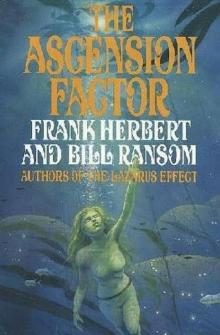 The Ascension Factor
The Ascension Factor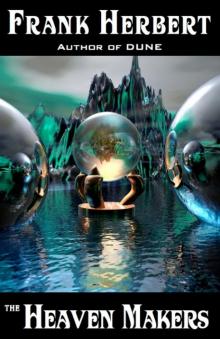 The Heaven Makers
The Heaven Makers Children of Dune
Children of Dune Old Rambling House
Old Rambling House Dune
Dune The Worlds of Frank Herbert
The Worlds of Frank Herbert The Jesus Incident
The Jesus Incident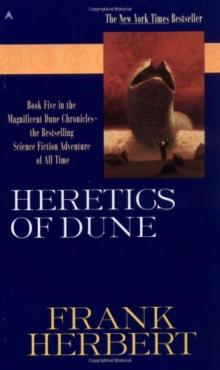 Heretics of Dune
Heretics of Dune Whipping Star
Whipping Star Dune Messiah
Dune Messiah Man of Two Worlds
Man of Two Worlds The Book of Frank Herbert
The Book of Frank Herbert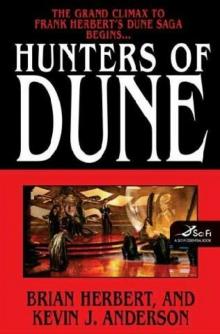 Hunters Of Dune
Hunters Of Dune The Tactful Saboteur
The Tactful Saboteur Soul Catcher
Soul Catcher God Emperor of Dune
God Emperor of Dune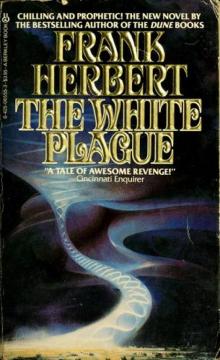 The White Plague
The White Plague The Green Brain
The Green Brain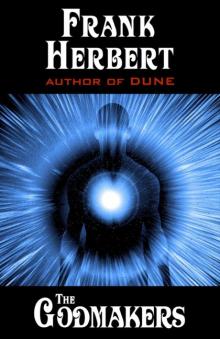 The Godmakers
The Godmakers Sandworms of Dune
Sandworms of Dune Destination Void
Destination Void The Dosadi Experiment
The Dosadi Experiment Eye
Eye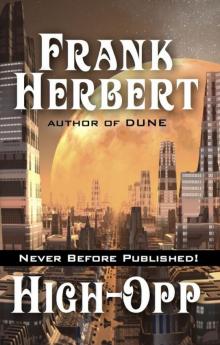 High-Opp
High-Opp The Eyes of Heisenberg
The Eyes of Heisenberg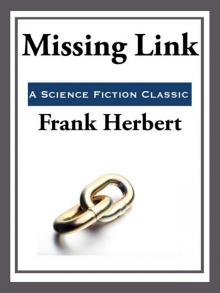 Missing Link
Missing Link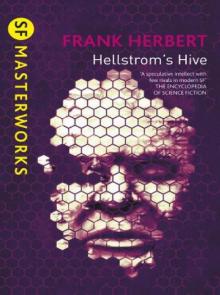 Hellstrom's Hive
Hellstrom's Hive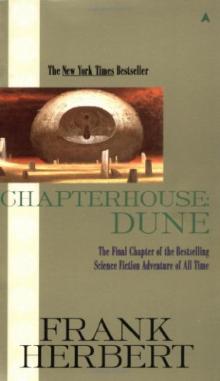 Chapterhouse: Dune
Chapterhouse: Dune The Santaroga Barrier
The Santaroga Barrier The Dragon in the Sea
The Dragon in the Sea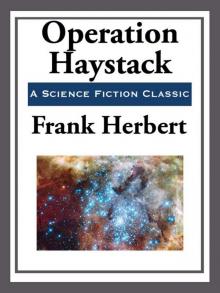 Operation Haystack
Operation Haystack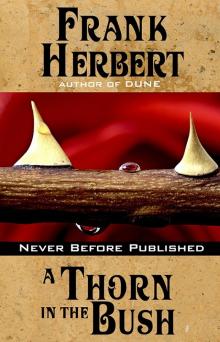 A Thorn in the Bush
A Thorn in the Bush Four Unpublished Novels
Four Unpublished Novels Dune dc-1
Dune dc-1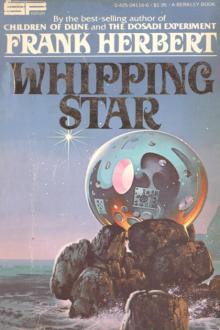 Jorj X. McKie 1 - Whipping Star
Jorj X. McKie 1 - Whipping Star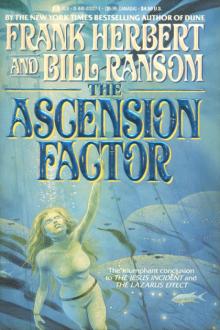 DV 4 - The Ascension Factor
DV 4 - The Ascension Factor Frank Herbert - Dune Book 4 - God Emperor Of Dune
Frank Herbert - Dune Book 4 - God Emperor Of Dune ChapterHouse: Dune dc-6
ChapterHouse: Dune dc-6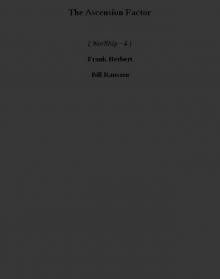 The Ascension Factor w-4
The Ascension Factor w-4 A Game of Authors
A Game of Authors Children of Dune dc-3
Children of Dune dc-3 Destination: Void: Prequel to the Pandora Sequence
Destination: Void: Prequel to the Pandora Sequence The Collected Stories of Frank Herbert
The Collected Stories of Frank Herbert Dune Messiah dc-2
Dune Messiah dc-2 Frank Herbert - Dune Book 5 - Heretics of Dune
Frank Herbert - Dune Book 5 - Heretics of Dune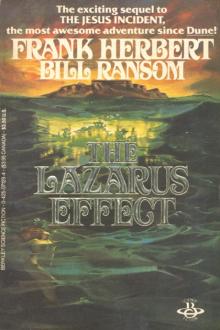 DV 3 - The Lazarus Effect
DV 3 - The Lazarus Effect The Jesus Incident w-2
The Jesus Incident w-2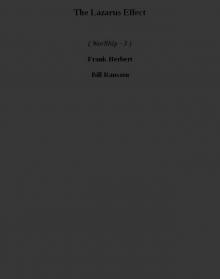 The Lazarus Effect w-3
The Lazarus Effect w-3 Frank Herbert
Frank Herbert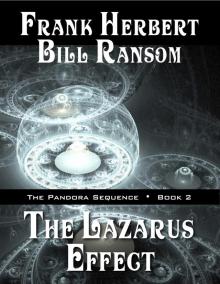 The Ascension Factor: Pandora Sequence
The Ascension Factor: Pandora Sequence Dune (40th Anniversary Edition)
Dune (40th Anniversary Edition) The Dosadi Experiment c-2
The Dosadi Experiment c-2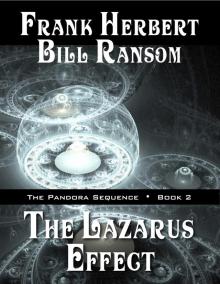 The Lazarus Effect
The Lazarus Effect God Emperor of Dune dc-4
God Emperor of Dune dc-4 The Pandora Sequence: The Jesus Incident, the Lazarus Effect, the Ascension Factor
The Pandora Sequence: The Jesus Incident, the Lazarus Effect, the Ascension Factor The Green Brain (v4.0)
The Green Brain (v4.0) The Heaven Makers (v4.0)
The Heaven Makers (v4.0) Heretics of Dune dc-5
Heretics of Dune dc-5